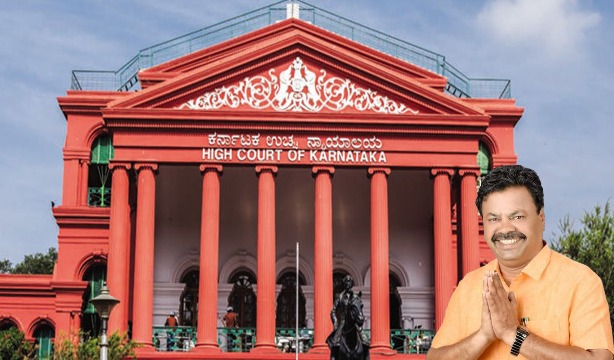
The Karnataka High Court has refused to dismiss an alleged allegation of disproportionate assets against BJP Leader M. Panchaksarya Renukacharya.
While dismissing the BJP MLA petition, a single bench of Justice K Natarajan stated that it lacked merit and liable to be dismissed.
The police had earlier registered a FIR on 30th November 2015, based on a private complaint filed by one Gurupadaiah, alleging Renukacharya had amassed wealth disproportionate to his known source of income while he was a Member of Legislative Assembly from 2004 to 2008, again from 2008 to 2013, and also from 25th December 2009 to 23rd December 2013 when he was Cabinet Minister of Government of Karnataka.
Furthermore, it was reported that in 2004, when he filed his nomination papers for the Honnalli MLA election, he declared his assets to be Rs.26,07,319, and that in the 2008 election, he declared his assets to be Rs.73,97,828 and that in 2013, he declared assets to be Rs.4,95,32,608.
“There was an increase in income and assets during his tenure as Minister in the State Government of Karnataka, he along with his brother has established Educational Institution by name Bapuji Educational Institution at Shimoga and the brothers had also amassed huge wealth when the petitioner was MLA and then became Minister,” the complaint reads.
The matter was submitted to Lokayukta police under section 156 (3) of the Cr.P.C. based on the private complaint. In turn, the police investigated the incident and filed a report, and a FIR was filed against Renukacharya.
The prosecution was challenged by the petitioner before the High Court, which granted the petition and quashed the FIR and subsequent proceedings, leaving the complainant free to pursue his complaint in accordance with the procedure laid down by the Hon’ble Supreme Court in the case of Priyanka Srivastava and Anr. Vs. State of Uttar Pradesh and Others.
Subsequently, the complainant again approached the Superintendent Police of Lokayukta and filed the complaint and the same was registered by the Lokayukta police under section 13 (1)(d) and (e) of the Prevention of Corruption Act, 1988 and section 120B and 420 of IPC.
The petitioners primarily contended that when the High Court set aside the FIR, the question of filing complaint to Lokayukta Police did not arise as the High Court had set aside the FIR for non following the guidelines of Priyanka Srivastava.
Following that, the complainant approached the Superintendent Police of Lokayukta and submitted a complaint, which was lodged by the Lokayukta police under sections 13 (1)(d) and (e) of the Prevention of Corruption Act, 1988, as well as sections 120B and 420 of the Indian Penal Code.
The petitioners essentially maintained that when the High Court dismissed the FIR, the issue of registering a complaint with the Lokayukta Police did not arise because the High Court dismissed the FIR for failing to follow the guidelines of Priyanka Srivastava.
The prosecution challenged the plea, claiming that the prior complaint was quashed by the High Court for failing to follow the Supreme Court’s rules in Priyanaka Srivastav’s case since he did not approach the police and higher officials under sections 154 (1) and 154 (3) of the Cr.P.C.
“Once the case filed under section 154(1) of Cr.P.C. has been complied by the complainant and the police have also lodged the FIR,” the bench remarked after reviewing the record. The issue of the complainant approaching the Superintendent of Lokayukta under section 154(3) of the Cr.P.C. is not raised. Furthermore, since the Lokayukta has already received the complaint and recorded the FIR, the subject of returning to the Sessions Court to file the complaint under Section 200 of the Cr.P.C. and submitting the complaint under Section 156(3) of the Cr.P.C. is irrelevant.”
The division bench also stated that the petitioner’s counsel’s position that the FIR is based on the same cause of action and numerous FIRs cannot be accepted because there is no multiple FIR in this case because the earlier FIR was quashed by the co-ordinate bench.
“But, if the complaint in PCR is pending before the Sessions Judge, it is of no use because the complainant can withdraw the same on the pretext of being infructuous as the police have already launched a FIR and are investigating the matter,” the statement reads.




